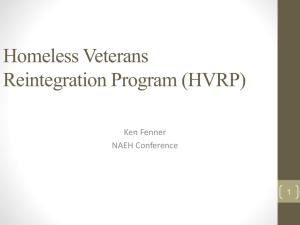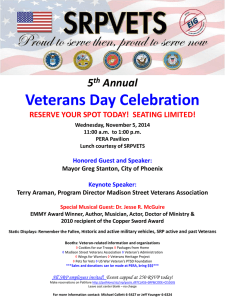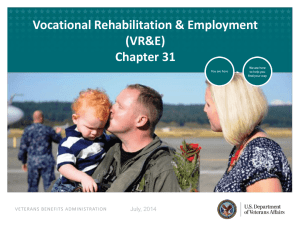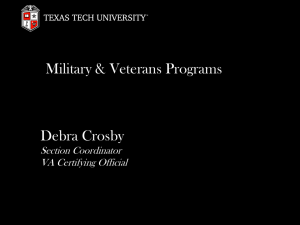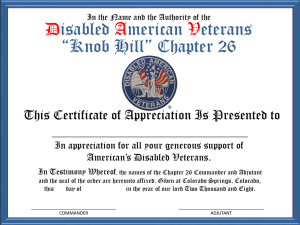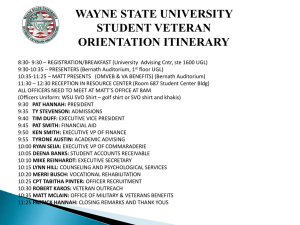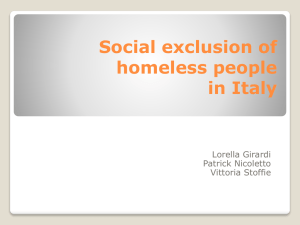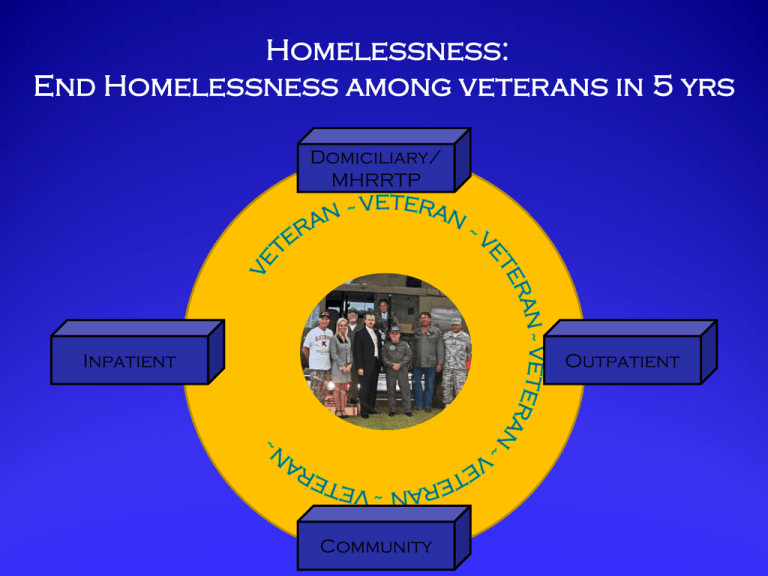
Homelessness:
End Homelessness among veterans in 5 yrs
Domiciliary/
MHRRTP
Inpatient
Outpatient
Community
Accessing VA Services and
Income for Homeless
Veterans
• HCHV Program: M. Chick-Ebey, LCSW Program
Coordinator; A. Sager, MD; E. Woods, MSW; J. Miles, MSW;
RN: Vacant, GPD: David Wall, LiCSW; Verneka Hudson,
LCSW
HUD/VASH: L, Adams, LMSW Program Coordinator Debra
Christian-Grandy, MSW; R. Haynes, LCSW; LCSW;Anthony
Miller, LCSW, Adam Coleman, MSW, Doris Cruea, MSW;
Corrie Williams, MSW, ; F. Culley, PSA
Synchronizing Plans
Increasing Leadership,
Collaboration, and Civic
Engagement
Increase Access to Stable and
Affordable Housing
Community
Partnership
Housing and
Supportive Services
Increase Economic Stability
Employment
Income and
Benefits
Improve Health and Stability
Treatment
Retool the Homeless Crisis
Response System
Homeless
Prevention
Outreach
Plan: 6-Pillars
Outreach / Education
Focus in shelters, streets,
Homeless Event Fairs (Stand
Down, Project Homeless
Connect) , Veterans Justice
Outreach (local jails).
National Call Center 24/7
Hotline
Educating Community Partners
and Internal Stakeholders – “No
wrong door.”
“Right Size services, Rapid-Rehousing
Treatment
Improved Access:
DIGMA/HPACT Primary Care
and Mental Health, daily walkin screening slot for Dom
MHRRTP.
Comprehensive Treatment and
Rehabilitation
Mental Health Residential
Rehabilitation Programs
(MHRRTP / Dom)
LINK program: 7 beds for
Chronically Homeless Veterans.
Homeless Veterans Dental
Initiative
Plan: 6-Pillars (Cont.)
Prevention
Supportive Services for Low
Income Families Grant – NOFA
recently closed: at least three
local applications submitted.
Relapse Prevention
Justice Involved Services
VJO – Veterans Justice
Outreach
HCRV – Healthcare for
Re-Entering Veterans
Housing/Supportive
Services
Grant and Per Diem
Transitional Housing (GPD);
Three programs, 90 beds (16
specifically for female
Veterans).
HUD VASH – Housing and
Urban Development Veterans
Affairs Supportive Housing
Community Housing
Resources: CANLINK, SRO’s,
Project Based vouchers.
Plan: 6-Pillars
Income/Employment
Community
Partnerships
VRT Programs (CWT/IT
Engagement of
for MHRRTP Veterans
HVSEP : Homeless Veteran
Supported Employment
Program
Expedite VA Disability
claims for Homeless
Veterans
Community Partners : 6
COC Committees, Military
Affairs Committee
Leveraging resources –
Continuum of Care
Committees (six in our
area – Veterans now
getting priority with HUD
Homeless Outreach: Healthcare for
Homeless Veterans (HCHV)
Minimum of twelve outreach visits per month; more in winter months
Outreach sites in Newport News, Portsmouth, Norfolk and Virginia
Beach (St. Vincent’s, Church shelters, Oasis, VOA, St. Columba,
Salvation Army 19th Street shelter, Union Mission).
Seasonal outreach to church shelter programs
Services also provided at Project Homeless Connect, Stand Down and
other Homeless Resource Fair events
Also Available for drop-in visits at VAMC Offices
DIGMA (Drop-IN Group Medical
Appointment), Primary Care clinic
Drop-in clinic designed to reduce barriers to care
Full array of Primary Care services provided
Clinic meets Tuesday afternoons and Friday mornings
Health and Resource Education built in to design of clinic
Veterans can remain in DIGMA clinic once housed if they
wish.
Approximately 269 veterans currently enrolled, over 1030 have
received care in DIGMA clinic
Mental Health Care also available at DIGMA clinic
Clinic recently awarded funding through Central Office Pilot
Project to become a full-time, PACT Primary Care Clinic (will
add individual slots. Target date: April , 2012).
Grant and Per Diem (GPD)
Community Agencies
partner with VA to
provide transitional
housing to homeless
Veterans.
1. Salvation Army TR: On
VA grounds, must provide
own food. Clean/Sober,
transitional environment.
Stay from several weeks
up to several months.
2. Malachi House: For female
veterans and veterans with
dependents. Apartment units
– stay up to two years.
Judeo- Christian Outreach- 16
beds (2 Female)
- 14 Bed new apartment style
building for single Veterans
(male or female)
- Tw0 female beds.
* New NOFA just announced for
Transition In Place GPD!!
HUD-VASH Program
Section 8 voucher and VA
Case Manager
360 currently, ratio of 1/35
Case Mgr. to veteran. Over
300 housed.
Currently over 200 on wait
list
Chronic Homeless
prioritized
Families with children also
a priority.
To be ready for HUD-
VASH: need ID’s, birth
certificates (for all family
members); can’t owe
landlords or utilities, need
deposits, credit reports.
Rapidly re-housed over 40
Veteran families with
HPRP assistance in FY11.
Homeless Hotline: 1-877-4AID
VET
1-877-4AIDVET went live 3/1/10.
Homeless team staff rotate to
handle calls: responders must
return calls within one business
day.
Calls/data logged nationally
and locally.
- 399 in FY’11 (ninth
nationally)
- Avg. 50 calls per month since
October 1st.
Several registrations,
GPD/MHRRTP admissions
from Hotline.
Vocational programs
Supported Employment (SE). SE is an evidence-based clinical model
that helps individuals with serious mental illness or physical
impairments co-occurring with mental illnesses engage in competitive
employment in the community.
Homeless Veteran Supported Employment Program (HVSEP).
A modified version of SE, HVSEP helps Veterans who are homeless or
at risk of being homeless engage in competitive employment in the
community with some additional support for first 90 days. HVSEP is
staffed by Vocational Rehabilitation Specialists who are formerly
Homeless Veterans. Referral from MD required.
CWT-Transitional Work Experience (TWE). TWE is a transitional work
program to enable participants to gain work experience and work
hardening while in a therapeutic rehabilitation treatment program in
the Domiciliary.
Domiciliary Residential
Rehabilitation Programs & TR
DAP: Drug Alcohol Program - 80 beds
Dom PTSD Program – 10 beds
Rehabitat – Homeless, SMI, Dual Diagnosis, -30 beds
DCM: Dom Case Management “Homeless
Program”: life skills, Must have Rehab Goals - 47
beds
CWT/TR: Community Residences for Homeless
Veterans active in the CWT Vocational Program: 6
month length of stay, generally following MHRRTP.
Length of stay is individualized but generally no
more than 90 days
VA Programs Work!
• Over 95% of those who complete recovery oriented
treatment have a place to stay upon discharge (may
be transitional housing).
• 66% of discharges from GPD and the DCHV
program in Q1FY12 went to stable housing (not
transitional: apartments, houses, Oxford Houses,
family reunification).
Local Status:
GAPS AND BARRIERS
• Prevention money lacking in region
• Shelter: Extremely limited year-round
•
•
•
•
•
•
•
shelter for single males, disabled,
couples, families & sex offenders.
HUD VASH & Income Based Housing:
need far outstrips supply.
Wait /Interest lists
No placements for convalescence
Limited Outreach Staff
Transportation
Limited rental room options:
overpriced, often illegal or unsafe
Difficulty navigating VA appointment
system from Homeless Status
OPPORTUNITIES
• SSVF Grant: local applicants
•
•
•
•
•
•
•
•
Emergency Housing & Medical
Respite Contracts (pending $$)
Project Based Developments
New GPD NOFA: Transition -in
Place.
Partnerships with other supported
housing programs (CANLINK,
VBCDC, Access, Project Based).
Cross-train community providers
Oxford Houses
Work with communities to develop
more Affordable housing
Homeless PACT Primary Care grant
FY11’ At A Glance
Some numbers are duplicated (e.g. one Veteran went
through several programs).
577 Intakes, 200 from Outreach,
1012 Veterans seen by
HCHV/GPD Staff.
214 Admissions to GPD
transitional Housing,; 50
Admissions to CWT TR.
Over 400 admissions to
MHRRTP and Treatment
Programs; 97 from Outreach.
HCHV/GPD workload increased
43% over FY’10.
Homeless Staff Attended 185
Community Meetings
314 Veterans Attained non-HUD
VASH Permanent Housing.
252 Veterans received Dental care
through Homeless Dental
Initiative.
260 Veterans enrolled in DIGMA
399 Homeless Hotline consults
(Minimum of over 20 enrolled, 16
MHRRTP admits, 18 GPD Admits)
92 veterans moved in to HUDVASH apartments
75 Veterans visited within local
jails.
Local Five Year Plan
Information sessions and trainings
for stakeholders across settings and
catchment area
Blanket region with brochures and
hotline publicity
Publicize SSVF and GPD NOFA’s:
write support letters.
Develop & manage contracts in the
community for Medical Respite and
Emergency Housing (pending
funding)
Annual Summit and Annual Report
(target September 2012).
Establish Full-time Homeless PACT
Primary Care Clinic
Accessing the VA: Eligibility
Every Veteran is not eligible for the
1.
2.
3.
4.
same services: Eligibility for
Healthcare Benefits is based on four
factors:
Discharge Status and LOS
(Length of Service): must have
two years after 1980 or combat
Full-time Active Duty or
Activated / Deployed
Reserve/Guard service is
required.
Service Connection Rating:
injuries or illnesses caused or
made worse by military service.
Income: if primarily non-service
connected (NSC), must be lowincome (Category A), or pay copays.
Eligibility Priority Categories
Veterans who are 70% or
more Service Connected
are highest priority and
are eligible for:
VA Nursing home care
Dental Care (unemployable or
100% SC only).
Prosthetics of all sorts
No co-pays or income
restrictions
Domiciliary MHRRTP
residential programs require
income waiver
OTHER DESIGNATIONS:
• Must be 10% or more Service
Connected to receive free
eyeglasses
• Must be service connected for
hearing loss (or 100% svc.
Connected) to receive hearing
aids.
• Care of Service Connected
condition is covered
• Co-pay is not required if income
is under NSC pension threshold
($1021 per month single).
• Highest numbers of Homeless
Veterans are NSC or low % SC.
Registering For VA Services:
Veterans must be registered to
receive care: like an insurance plan
NSC and Veterans less than 10% SC
must complete annual means test or
risk getting billed
Must have photo ID to register
DD214 or HINQ (computer inquiry
to verify service) required
Best to register in person and not by
mail (backlog).
Homeless Veterans should request
to be seen day of registration
Call Wayne Hopkins at 722-9961
x3040 if you have more questions
Outreach staff can help (if photo id)
VA Financial Benefits: All Veterans that
receive VA Healthcare benefits are NOT eligible for Financial Benefits.
Service Connection
NSC Pension (war era only)
Amount is determined by
Available to Veterans who are
unemployable due to disability
(regardless of cause) or over age
65 with income less than $1021
per month
Means tested
Many restrictions
Current payment is $1021 per
month, about $1700 for Aid and
Attendance (if qualify).
percentage of disability
determined by VBA
0% no money but not a bad
thing
10% is $127 per month
100% is $2769 per month
50% is not half of 100%
See handout or VBA website for
more details: www.VA.gov
Restrictions similar to SSI
Qsee VA Benefits handout for more details
Where / How to file a Claim
Virginia Department of Veterans Services (VADVS) offices in
Norfolk and Hampton: both take walk-in’s (certain hours may
apply).
DAV, American Legion, VFW or other Veterans Service
Organization (VSO): nearly all VSO’s have claims
representatives.
Veterans can also self-file online or on paper.
Homeless Claims can be expedited/rushed: must contact
HCHV staff for verification.
Hardship status can also rush claims (must show evidence).
Quality Improvement Project completed by PCMH December 2010
Questions???
Please take some goodies: pens, brochures, key-
chains. Let us know if you’d like us to present to
your colleagues or group.
Thank you for your interest in helping Homeless Veterans!

